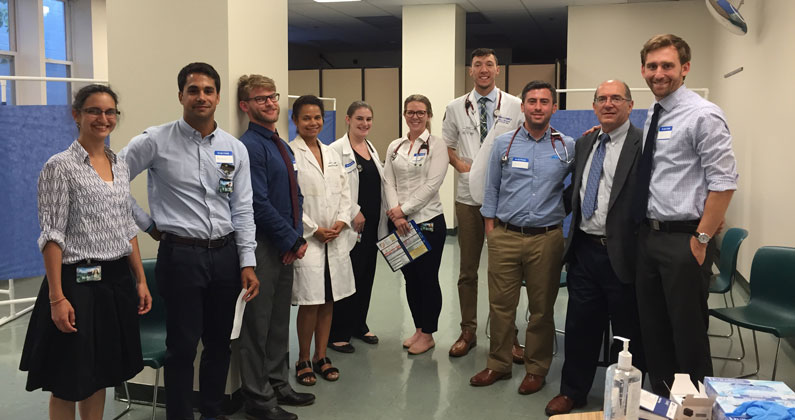Students Launch Clinic at Women's Shelter
November 9, 2016 Philadelphia College of Osteopathic Medicine students are helping provide care at
a women's shelter. The clinic, which launched in July, has seen approximately 30 residents
to date.
Philadelphia College of Osteopathic Medicine students are helping provide care at
a women's shelter. The clinic, which launched in July, has seen approximately 30 residents
to date.
A few shy women file into a multi-purpose room at the St. Barnabas Shelter in West
Philadelphia, which has been set up with curtains to act as makeshift exam rooms.
Tables and chairs are pushed into one corner, and children’s toys are in another,
flanking a small television set.
Each woman sits at a table near the front of the room, and a Philadelphia College
of Osteopathic Medicine student talks to her, takes her medical history and asks if
she is having any health issues. The women then go behind one of the curtains for
an exam with another PCOM student. The attending physician—one of PCOM’s family medicine doctors—joins the students and confirms and determines the diagnosis and course of treatment.
Despite balancing heavy course loads and long hours of studying, first- and second-year
DO students at PCOM, led by Christopher Gable (DO ’18) and Adam Kardon (DO ’18) have
been volunteering their time once a month over the past several months to help the
women at St. Barnabas.
Both Gable and Kardon were looking for a way to use their medical knowledge to help
underserved populations in the city, and after consulting with JeffHOPE (a student-run
group at the Sidney Kimmel Medical College that holds similar clinics throughout the
city), they learned of the need at St. Barnabas.
“The residents at St Barnabas have not had any kind of clinical care there for 13
years,” said Gable. “Children’s Hospital of Philadelphia (CHOP) runs a clinic there
once a month, so the children can get care. But the women haven’t had their health
needs addressed. And if the moms aren’t healthy, it’s harder for them to take care
of their children.”
Gable and Kardon decided to start a clinic, based on the CHOP model, to help address
the unique health needs of women who are homeless. It can be difficult for these women
to receive care, even if they are insured through Medicaid; a recent report from the
American College of Obstetricians and Gynecologists cited five barriers to health
care for homeless women: 1) social triaging; 2) being stigmatized for being homeless;
3) lack of care through the health system; 4) disrespectful treatment; and 5) feeling
ignored by health care providers.
The report noted that as a result of these barriers, homeless women often chose to
forgo medical treatment even at the risk of compromising their health, and will only
use the health care system if there is an emergency.
“We’re bringing these services directly to the shelter, where they are, and we’re
their guests,” said Gable. “We want to make sure that whatever we're doing is in the
women’s best interest, and one way to do that is by modeling what's already there.”
Kardon added much of the activities first- and second-year students do during their
time at the clinic is advocacy for the patients—trying to put them in touch with Medicaid,
or to a primary care provider, or to a pharmacy if they have prescription insurance.
“We’re also there to help triage problems and, if need be, send them to PCOM’s Lancaster Avenue Healthcare Center or to Lankenau Medical Center for further care.”
The clinic, which launched officially in July, has seen about 30 residents thus far,
and students have seen a variety of issues within the population, such as heart murmurs,
uncontrolled diabetes, hypertension and depression. Kardon says that because psychological
issues are so prevalent among the homeless population, he hopes to bring psychology
students on board as well. The group also hopes to expand to a second site by the
start of the next academic year.
“In this shelter are women who are in the most vulnerable position of their lives,”
said Harry J. Morris, DO ’78, MPH, professor and chair, family medicine. “This project—started by two students who
truly wanted to help this community—provides needed care for these women as well as
a unique experience for our first- and second-year students.”
This project is funded through a grant from the Lankenau Medical Center.
You May Also Like:
About Philadelphia College of Osteopathic Medicine
For the past 125 years, Philadelphia College of Osteopathic Medicine (PCOM) has trained
thousands of highly competent, caring physicians, health practitioners and behavioral
scientists who practice a “whole person” approach to care—treating people, not just
symptoms. PCOM, a private, not-for-profit accredited institution of higher education,
operates three campuses (PCOM, PCOM Georgia and PCOM South Georgia) and offers doctoral degrees in clinical psychology, educational psychology, osteopathic
medicine, pharmacy, physical therapy, and school psychology. The college also offers
graduate degrees in applied behavior analysis, applied positive psychology, biomedical
sciences, forensic medicine, medical laboratory science, mental health counseling,
physician assistant studies, and school psychology. PCOM students learn the importance
of health promotion, research, education and service to the community. Through its
community-based Healthcare Centers, PCOM provides care to medically underserved populations.
For more information, visit pcom.edu or call 215-871-6100.
Contact Us
Brandon Lausch
Executive Director, Strategic Communications
Email: brandonla@pcom.edu
Office: 215-871-6312 | Cell:
717-371-0609
Connect with PCOM
 Philadelphia College of Osteopathic Medicine students are helping provide care at
a women's shelter. The clinic, which launched in July, has seen approximately 30 residents
to date.
Philadelphia College of Osteopathic Medicine students are helping provide care at
a women's shelter. The clinic, which launched in July, has seen approximately 30 residents
to date.